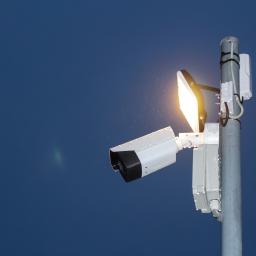Leiden University, TU Delft and Erasmus University Rotterdam are all important players in the world of machines that are self-learning and can work together with people. Moreover, the three universities are strongly intertwined in the field of AI and want to further strengthen this collaboration in the future. An overview of artificial intelligence in Zuid-Holland.
From image recognition in MRI scans to information searches in law firms, you can find artificial intelligence everywhere. You see it in the universities that are conducting research across the entire spectrum of this acclaimed yet sometimes maligned field. At Leiden University, much of this, of course, takes place in the Leiden Institute of Advanced Computer Science (LIACS), but by no means exclusively there. AI is everywhere, from archaeology to biology, from linguistics to healthcare.
Privacy by design
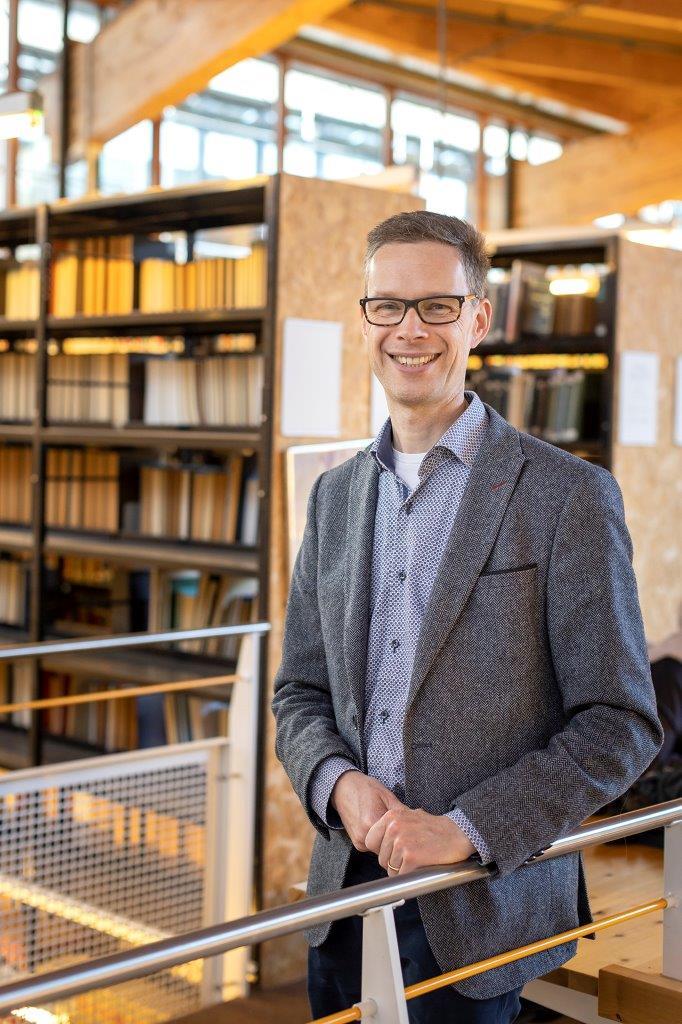 The Faculty of Law, for example, has Bart Custers, who is Professor of Law and Data Science and head of eLaw, the Centre for Law and Digital Technologies. One of the centre’s focus areas is to ensure that people don’t get crushed between the cogs of technology. ‘We don’t want to end up in a Kafkaesque society.’ Custers tries to ensure that technicians, ethicists and legal experts work together. ‘Then you can achieve privacy by design: building in all kinds of safeguards beforehand so you don’t get problems afterwards.’
The Faculty of Law, for example, has Bart Custers, who is Professor of Law and Data Science and head of eLaw, the Centre for Law and Digital Technologies. One of the centre’s focus areas is to ensure that people don’t get crushed between the cogs of technology. ‘We don’t want to end up in a Kafkaesque society.’ Custers tries to ensure that technicians, ethicists and legal experts work together. ‘Then you can achieve privacy by design: building in all kinds of safeguards beforehand so you don’t get problems afterwards.’
Today’s ‘hot’ intelligent systems are no longer merely programmed to perform searches or fast calculations; they are self-learning on the basis of big data. Self-learning systems are making quick advances in the medical world. An AI system can examine a million X-ray photos to learn to distinguish tumours, in theory with a greater degree of accuracy than a radiologist can. And the same applies to other forms of imaging technology, such as MRI and CT scans. Leiden is at the forefront of this technology.
Professor in Leiden and Delft
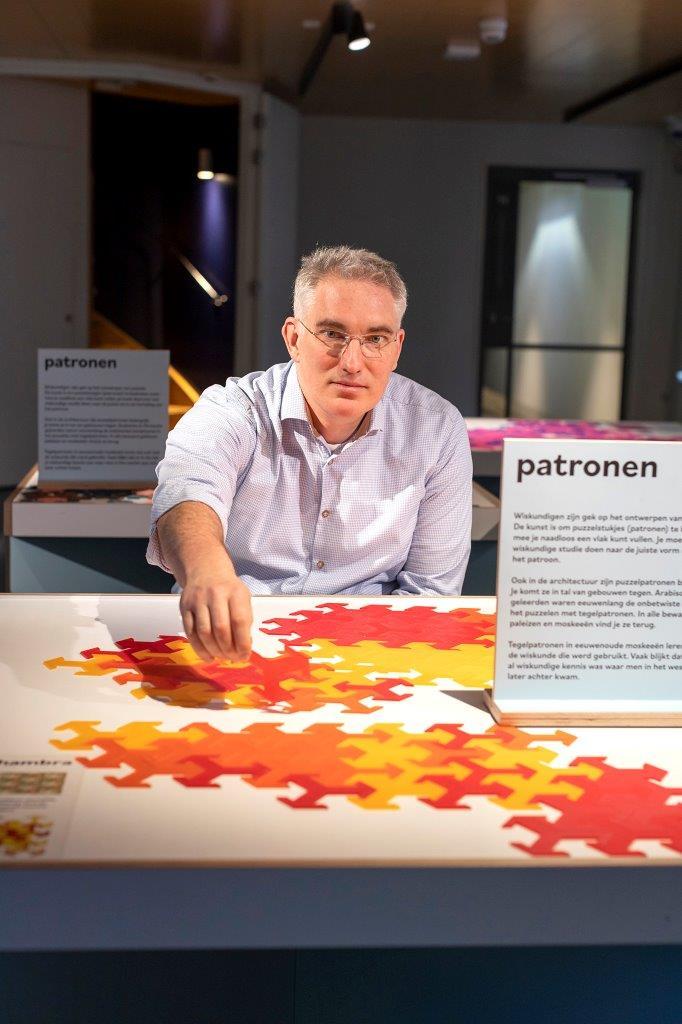 Boudewijn Lelieveldt is Professor of Biomedical Imaging and head of the Division for Image Processing (LKEB) at LUMC, where they are developing intelligent systems that can recognise concealed patterns in huge amounts of imaging data. However, Lelieveldt stresses: ‘No matter how intelligent systems may be, the doctor must always be the one to make the decisions.’
Boudewijn Lelieveldt is Professor of Biomedical Imaging and head of the Division for Image Processing (LKEB) at LUMC, where they are developing intelligent systems that can recognise concealed patterns in huge amounts of imaging data. However, Lelieveldt stresses: ‘No matter how intelligent systems may be, the doctor must always be the one to make the decisions.’
Lelieveldt is a professor in Delft as well as Leiden, in the Faculty of Electrical Engineering, Mathematics and Computer Science (EEMCS), where Catholijn Jonker also works. Just like Lelieveldt, she holds a post at both universities.
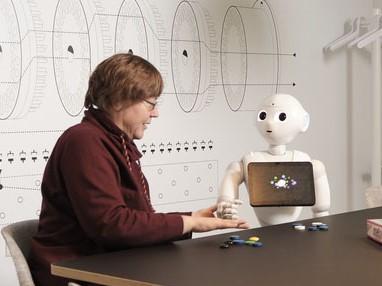 Hybrid intelligence
Hybrid intelligence
Jonker is a proponent of optimal hybrid intelligence, in which man and system strengthen each other in an interactive way. ‘Compare it to a sheepdog that strengthens the shepherd’s capacity to herd sheep.’ Achieving this requires a dialogue between man and machine, and at the two universities, she can collaborate with all the colleagues needed to accomplish this.
In addition to the Faculty of EEMCS, there are many other places at TU Delft where scientists are working on artificial intelligence or autonomous systems, whether it be pure software, such as decision support programs or embedded programming in robots, cars or drones, or research into everything involved in designing AI-based solutions in an ethically responsible and people-oriented way, and introducing them into our complex society.
Not just zeros and ones
Jonker’s work and also that of eLaw researcher Custers show that AI research is not just about zeros and ones, but also the interaction with and consequences for people. This is also true of the AI research at Erasmus University Rotterdam. The Erasmus Centre for Data Analytics (ECDA) coordinates and facilitates AI and data-related research in all the university’s faculties. Twelve professors are collaborating in interdisciplinary Expert Practices , such as the audit, accounting and control analytics lab, which enriches accountancy with fraud detection algorithms.
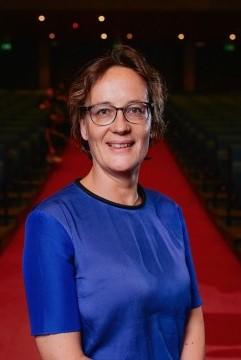
One of ECDA’s Academic Directors is Antoinette de Bont, Professor of Sociology of Innovations in Healthcare at the Erasmus School of Health Policy & Management. Her work includes looking at digitisation and the use of big data from a societal perspective: ‘How can you ensure data is stored and re-used safely and securely? How do you determine whether an algorithm is reliable? This issue raises all kinds of legal, ethical and moral questions, particularly if algorithms fall into the hands of commercial companies.’
Technological solutions for sustainable care...
Among other places, a collaboration between the three universities and the Erasmus MC and LUMC medical centres takes place within the Medical Delta, which also includes universities of applied sciences, care institutions, business and local authorities in Zuid-Holland. Since the launch of a major academic programme in 2019, over 280 researchers in 13 consortia have been working on technological solutions for sustainable care. One interesting example that uses AI is wireless neuromonitoring of people with migraine or autism. Ultrasound can be used to measure their brain activity over a longer period of time in their own surroundings, for an optimum diagnosis. The ultimate aim is to develop software that can also correct their brain activity.
...And for large companies
Besides improvements in healthcare, the wide AI expertise in the three universities in Zuid-Holland can also benefit major players in the region for whom AI is of crucial importance for competing in the world market. For example the Rotterdam port authority, the petrochemicals industry and other multinationals. The perspective from all academic disciplines makes the Zuid-Holland approach to artificial intelligence unique and relevant to society and academia alike.
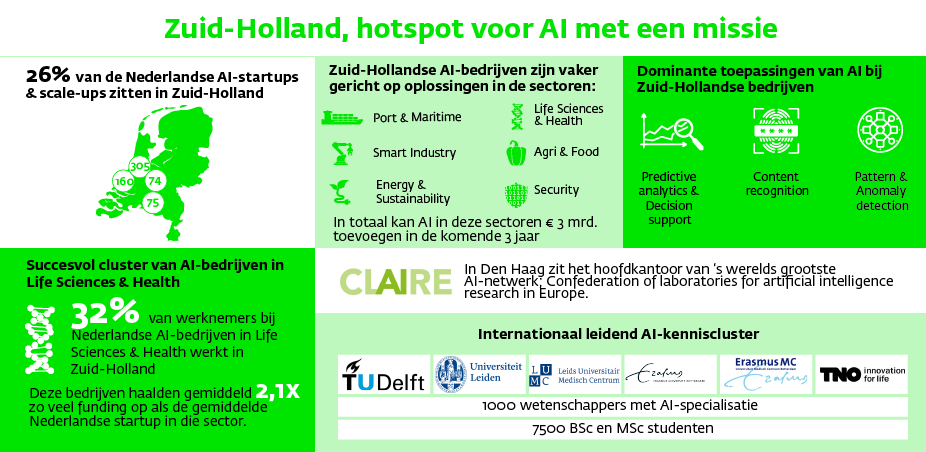
Zuid-Holland hotspot for artificial intelligence
For decades, Dutch knowledge institutions have been important players in international AI research. Zuid-Holland is home to a particularly large proportion of these: TNO and the universities in Leiden, Delft and Rotterdam jointly account for almost 1000 scientists and over 7,500 Bachelor and Master graduates who are specialised in AI. Moreover, at the end of last year CLAIRE, the world’s largest AI research network, settled in The Hague.
Read the report from Innovation Quarter about AI in Zuid-Holland, which was published on 25 May 2020.
And also:
Zuid-Holland joins forces in AI, data and digitisation / As part of the convergence between scientific disciplines and led by Prof. Geert-Jan Houben, professor at the Faculty of Electrical Engineering, Mathematics and Computer Science at TU Delft, Prof. Michiel Kreutzer, Dean of the Faculty of Science at Leiden University and Gerrit Schipper, Director of the Erasmus Centre for Data Analytics at Erasmus University Rotterdam, the universities are joining forces in AI, data and digitisation. The three universities intend to create far-reaching impact in AI-related research and education. In order to achieve this, they are jointly making the necessary knowledge, resources, facilities and drive available. More news will follow after the summer.
Delft AI Initiative / TU Delft actively brings scientists engaged in research on and using artificial intelligence together in special AI labs as part of the TU Delft AI Initiative. Around fifty researchers from all domains will be spending the coming five years in eight such labs, working on such themes as more liveable cities and climate-proof water management. Another 16 of these TU Delft AI Labs are in the pipeline. The university wants to double the annual budget for AI research and education, data and digitisation, to 70 million euros.
SAILS in Leiden / SAILS is a university-wide incentive programme at Leiden University, aimed at widening and deepening expertise in the field of artificial intelligence. Read more about this expertise on the Leiden University AI page.
ESL & Digital Governance / The European Commission has awarded three researchers from the Erasmus School of Law and their colleagues from the UK and Israel a Jean Monnet Centre of Excellence. This award is specifically reserved for excellent research groups that have an interdisciplinary approach and a visible societal impact. The new centre is called Digital Governance (DIGOV) and will spend the next three years arranging topical conferences, workshops and a programme for visiting researchers, aimed at getting a better understanding of how to shape legal designs that integrate Big Data and Artificial Intelligence more solidly into society. DIGOV is one of the above-mentioned Expert Practices within the Erasmus Centre for Data Analytics (ECDA).
European AI / Leiden is the cradle of CLAIRE, which aims to ensure that European investment in AI is at the same level as it already is in the USA and China, through joint ventures throughout all of Europe. CLAIRE was established by the Leiden professor Holge Hoos.
AI and healthcare / On Thursday, 2 July 2020, the LUMC CAIRELab together with the Artificial Intelligence for Medical Technology Meetup is hosting a virtual meet-up on AI in the healthcare sector. Read more
AI recognition for TU Delft / The European Laboratory for Learning and Intelligent systems (ELLIS) has chosen TU Delft as one of its units for excellent European research in the field of AI and machine learning.

